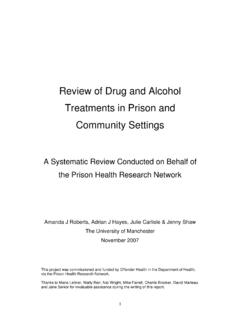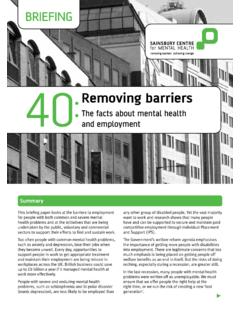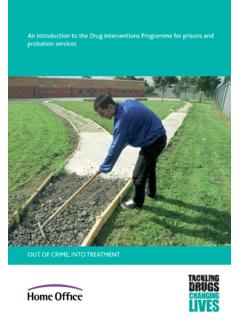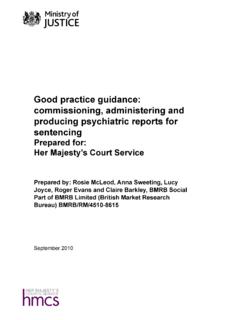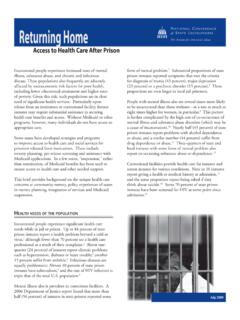Transcription of The pathway of prisoners with mental health problems ...
1 The pathway of prisoners with mental health problems through prison health services and the effect of the prison environment on the mental health of prisoners April 2010 A report to the National Institute of health Research 2 Copyright 2010 The Offender health Research Network Title: The pathway of prisoners with mental health problems through prison health services and the effect of the prison environment on the mental health of prisoners . First published: April 2010 Published to OHRN website, in electronic PDF format only Unless otherwise stated, the copyright of all the materials in this report is held by The Offender health Research Network.
2 You may store and reproduce this document for personal and educational uses only. Applications for permission to use the materials in this document for any other purpose should be made to the copyright holder. Commercial copying, hiring and lending is strictly prohibited. The Offender health Research Network is funded by Offender health at the Department of health , and is a collaboration between several universities, based at the University of Manchester. It was established in 2002 to develop a multi-disciplinary, multi-agency network focused on offender health care innovation, evaluation and knowledge dissemination.
3 3 Research Team The University of Manchester Professor Jenny Shaw, Consultant Forensic Psychiatrist, Professor in Forensic Psychiatry Professor Graham Dunn, Professor in Biomedical Statistics Professor Anne Rogers, Professor of the Sociology of Healthcare Dr Charlotte Lennox, Research Associate Dr. Jane Senior, Research Network Manager, Offender health Research Network Dr. Roger Webb, Research Fellow Carrie Lowthian, Research Associate and Project Manager Ruth Clayton, Research Assistant Nicola Coxon, Research Assistant Kirsty Foster, Research Assistant Lamiece Hassan, Research Assistant Carlene King, Research Assistant Oliver Turner, Research Assistant The Institute of Psychiatry Professor Graham Thornicroft, Professor of Community Psychiatry Professor Kevin Gournay CBE, Professor of Psychiatric Nursing Professor Tom Fahy, Professor of Forensic mental health 4 Dr.
4 Mari Anne Harty, Associate Medical Director and Consultant Forensic Psychiatrist Manuela Jarrett, Research Associate Mariamne Rose, Research Associate Julie Steele, Research Associate University of Southampton Professor Judith Lathlean, Professor of health Research and Director of Research Dr. Luke Birmingham, Honorary Consultant Forensic Psychiatrist, Senior Lecture in Forensic Psychiatry Dr Kathleen Kendall, Senior Lecturer in Sociology as Applied to Medicine Dr. Alice Mills, Research fellow University of Lincoln Professor Charlie Brooker, Professor of mental health & Criminal Justice Dina Gojkovic Research Associate University of Cambridge Professor Peter Jones, Professor of Psychiatry Professor Alison Liebling, Professor of Criminology and Director of the Prisons Research Centre at the Institute of Criminology prison Clinical Secondees George Coffee Julia Hookway Kathy Justo Paul Kelly 5 Paul Ralphs Donald Toseafa Address for correspondence.
5 Professor Jenny Shaw Offender health Research Network Hostel 1, Ashworth Hospital, Maghull Merseyside L31 1HW E-mail: 6 Acknowledgements We gratefully acknowledge the practical help and assistance given to the research team by prison discipline and healthcare staff and managers in facilitating our work in each of the study sites. We also acknowledge those individuals that assisted with the preparation of the final report including Gregg Barron, Francesca Reeder and Caroline Stevenson. 7 Executive Summary Introduction There is widespread concern that the prison environment, with its rules and regimes, may have a detrimental impact on the mental health of prisoners , and those with mental illnesses in particular (Birmingham, 2003).
6 It is well documented that the prevalence of psychiatric morbidity and substance misuse is higher among prisoners than the general population (Singleton et al, 1998; Singleton et al, 1999; Fazel & Danesh, 2002). Indeed, the growing prison population means that there are now more people in prison with mental illnesses than ever before (Bradley, 2009). The standard of healthcare provided within prisons has, historically, been criticised (Smith, 1990). However, in recent years there have been signs of improvement. In particular, the handover of responsibility of prison healthcare from the prison Service to the NHS has heralded significant developments in prison mental health and substance misuse services (DH & HMPS, 2001; DH & NIMHE, 2005; NTA, 2008).
7 Indeed, current prison healthcare policy asserts that prisoners are entitled to the same range and standard of care as that received by the general population in community settings (HMPS & NHS Executive, 1999; DH & HMPS, 2001). Delivering quality healthcare services in prisons is a complex undertaking, hampered by not only the high level of need amongst prisoners , but also the constraints of the prison environment, which is often viewed as anti-therapeutic and counter-productive to the effective provision of care (Sykes, 1958; Sim, 1994; Hughes, 2000; Scott, 2004).
8 Factors such as overcrowding, separation from family and friends, boredom and loss of autonomy have all been identified as being potentially detrimental to mental health (Smith, 2000; Wener & Keys, 1988; Nurse et al, 2003). Nonetheless, some have questioned whether prison is universally harmful (Bonta & Gendreau, 1990). There is a paucity of empirical evidence as to what effect incarceration has on the health of prisoners , and in particular, those with existing mental health problems . However, one small-scale study has found that psychotic symptoms in a sample of adult males were not exacerbated by imprisonment (Blauuw et al, 2007).
9 Given the focus on improving standards of healthcare over the last two decades, it is therefore timely and reasonable to question whether prisons truly remain wholly anti-therapeutic environments. This programme of work examined the course of mental illness in prison populations, tracking the health services received by mentally ill prisoners from reception into prison through to discharge, and undertook an examination of prisoners perceptions of their quality of life in custody. 8 Research aims This study aimed to observe the effect of imprisonment on mental health in a sample of prisoners with and without mental illness.
10 Three research questions were identified: 1. How does time spent in prison impact on the mental health of prisoners with and without a mental illness? 2. What are prisoners perceptions of their quality of life in prison ? 3. What type of contact with health services do prisoners with a mental illness have whilst in prison ? Methods Psychiatric symptoms were monitored in a sample of 980 prisoners from five prisons at three time points during custody. Participants were firstly interviewed following reception into custody (T1; <1 week). At the interview the Schedule for Affective Disorders and Schizophrenia (SADS; Endicott & Spitzer, 1978) was used to diagnose mental illness.
